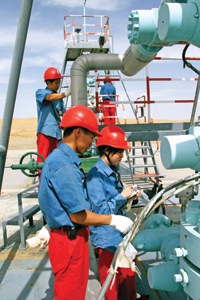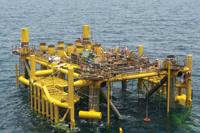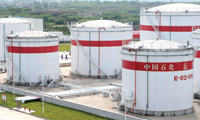
 CNPC ... trying for a foothold on Saudi fields
CNPC ... trying for a foothold on Saudi fields
SAUDI Arabia is unlikely to reverse its decades-old policy of prohibiting foreign involvement in oil exploration and production (E&P), despite a plea from China for the world’s leading crude exporter to open up.
Chinese Premier Wen Jiabao has called on Saudi Arabia to open its huge oil and gas resources to more Chinese companies, including its upstream oil industry, which has remained under sole Saudi control for decades.
China is the kingdom’s biggest oil buyer, and Saudi Arabia is China’s biggest supplier. But Riyadh has little to gain from letting Chinese companies into its crude production business and is likely for the foreseeable future to keep Chinese involvement limited to downstream oil ventures and so far unrewarding searches for gas.
“I am sure they will not do it,” a Saudi industry source says, when asked whether Saudi Arabia would allow any Chinese involvement in crude oil production. “To Saudi Arabia this is a sovereign matter.”
China’s first big step into the Saudi downstream industry was confirmed over the weekend when Saudi Aramco signed a $10 billion deal during Wen’s visit to build a 400,000 barrel-per-day (bpd) oil refinery in Yanbu with China’s Sinopec Group.
Riyadh has welcomed several foreign partners into its growing refining sector and has invited foreign energy companies including Sinopec to scour the vast, uninhabited desert in Saudi Arabia’s southeast for gas. But the kingdom is unlikely to loosen its grip on the wells that pump around 10 mbpd of crude at very low cost and on which the rest of the Saudi economy depends.
“I don’t see any prospect of Saudi opening up the upstream for anyone,” Jamie Webster, a Saudi energy industry analyst at PFC Energy in Washington, says.
Gordon Kwan, head of energy research of Mirae Asset Management in Hong Kong, says the odds of Chinese companies playing a role in Saudi upstream projects might improve slightly if the Yanbu joint venture is a great success.
“But in the short term, I believe we are still talking about service contracts mostly,” Kwan says.
US oil companies were a driving force behind the Saudi oil boom of the 1940-1950s, under the name Arabian American Oil Company (Aramco). But the Saudi government took full control in 1980 and the company was renamed Saudi Aramco in 1988. No foreign companies have been allowed back into the upstream oil sector since, despite calls from some Saudi political leaders to open it up.
Saudi Arabia is now the last remaining oil producer that still bans foreign companies from having any involvement in upstream oil fields after Mexico awarded its first-ever private oilfield operating contracts last year.
Mexico is reluctantly opening up to foreign companies with deepwater oil exploration expertise because it needs to revive its rapidly declining output in the Gulf of Mexico. By contrast, oil minister Ali Al Naimi says Saudi Arabia can rapidly ramp up production at will.
With decades of Saudi experience in finding and pumping crude from under its vast deserts, Naimi seems unlikely to see any advantage in allowing Chinese oil companies try their hand at it. And unlike cash-strapped Pemex of Mexico, Aramco has the wealth and technical know-how to tap offshore fields in the relatively shallow waters of the Gulf.
China’s increasing dependence on imported oil and gas has driven a worldwide drive by its oil companies – led by China National Petroleum Corporation (CNPC) – to acquire upstream assets from Latin America to the Middle East.
Growing Chinese experience in unconventional gas projects and in building nuclear power stations may prove useful to a Saudi economy that needs alternatives to oil-fired power generation.



































































































